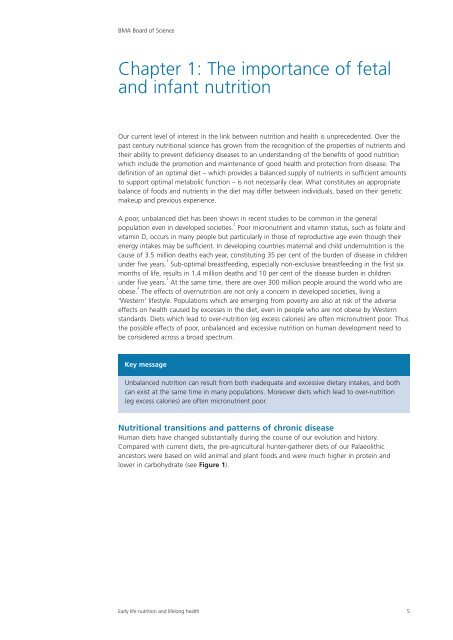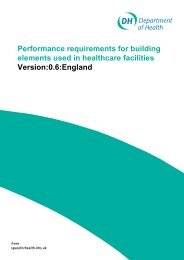Early Life Nutrition and Lifelong Health - Derbyshire Local Medical ...
Early Life Nutrition and Lifelong Health - Derbyshire Local Medical ...
Early Life Nutrition and Lifelong Health - Derbyshire Local Medical ...
Create successful ePaper yourself
Turn your PDF publications into a flip-book with our unique Google optimized e-Paper software.
BMA Board of ScienceChapter 1: The importance of fetal<strong>and</strong> infant nutritionOur current level of interest in the link between nutrition <strong>and</strong> health is unprecedented. Over thepast century nutritional science has grown from the recognition of the properties of nutrients <strong>and</strong>their ability to prevent deficiency diseases to an underst<strong>and</strong>ing of the benefits of good nutritionwhich include the promotion <strong>and</strong> maintenance of good health <strong>and</strong> protection from disease. Thedefinition of an optimal diet – which provides a balanced supply of nutrients in sufficient amountsto support optimal metabolic function – is not necessarily clear. What constitutes an appropriatebalance of foods <strong>and</strong> nutrients in the diet may differ between individuals, based on their geneticmakeup <strong>and</strong> previous experience.A poor, unbalanced diet has been shown in recent studies to be common in the generalpopulation even in developed societies. 2 Poor micronutrient <strong>and</strong> vitamin status, such as folate <strong>and</strong>vitamin D, occurs in many people but particularly in those of reproductive age even though theirenergy intakes may be sufficient. In developing countries maternal <strong>and</strong> child undernutrition is thecause of 3.5 million deaths each year, constituting 35 per cent of the burden of disease in childrenunder five years. 3 Sub-optimal breastfeeding, especially non-exclusive breastfeeding in the first sixmonths of life, results in 1.4 million deaths <strong>and</strong> 10 per cent of the disease burden in childrenunder five years. 3 At the same time, there are over 300 million people around the world who areobese. 4 The effects of overnutrition are not only a concern in developed societies, living a‘Western’ lifestyle. Populations which are emerging from poverty are also at risk of the adverseeffects on health caused by excesses in the diet, even in people who are not obese by Westernst<strong>and</strong>ards. Diets which lead to over-nutrition (eg excess calories) are often micronutrient poor. Thusthe possible effects of poor, unbalanced <strong>and</strong> excessive nutrition on human development need tobe considered across a broad spectrum.Key messageUnbalanced nutrition can result from both inadequate <strong>and</strong> excessive dietary intakes, <strong>and</strong> bothcan exist at the same time in many populations. Moreover diets which lead to over-nutrition(eg excess calories) are often micronutrient poor.<strong>Nutrition</strong>al transitions <strong>and</strong> patterns of chronic diseaseHuman diets have changed substantially during the course of our evolution <strong>and</strong> history.Compared with current diets, the pre-agricultural hunter-gatherer diets of our Palaeolithicancestors were based on wild animal <strong>and</strong> plant foods <strong>and</strong> were much higher in protein <strong>and</strong>lower in carbohydrate (see Figure 1).<strong>Early</strong> life nutrition <strong>and</strong> lifelong health 5



